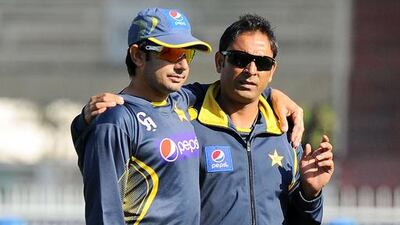SHARJAH // Captain Misbah-ul-Haq may finally give a second spinner a chance as Pakistan look for the right combination to level the series against Sri Lanka in the third Test, which begins today on a flat Sharjah pitch.
“You get spin on the pitches here as far as Test cricket goes,” Misbah, who has a say in the selection of the playing XI, said yesterday. “It’s a do-or-die situation for us and we have to level the series. There is no other option.”
Pakistan and Misbah also thought the second-Test pitch in Dubai last week would take spin, but they went with only Saeed Ajmal and the pitch hardly broke. Sri Lanka registered their biggest victory in Tests against Pakistan in winning by nine wickets to take a 1-0 lead.
In their five previous Tests at Sharjah Cricket Stadium, Pakistan had two wins over the West Indies in 2002, twice lost to Australia by an innings in the same year and drew with Sri Lanka in 2011. “Out of five matches, four have produced results so you can’t say that the pitch doesn’t produce results,” Misbah said.
Bringing in left-arm spinner Abdur Rehman also could be expedient as fast bowler Bilawal Bhatti has been nursing a hamstring injury since bowling in the first innings of the second Test.
Misbah is unlikely to tinker with his top order batsmen despite Ahmed Shehzad, Khurram Manzoor and Mohammad Hafeez struggling against the Sri Lanka seamers – especially with the new ball. The three have each scored a half century in the series and have the backing of their captain.
“Two innings can go bad for anyone,” Misbah said. “The new ball is always difficult, so we are not worried about that very much.”
While Pakistan have had a lot of work and reflection after the heavy defeat on Sunday, Sri Lanka captain Angelo Mathews just wants that his teammates do not get complacent and look to win again.
Mathews has led from the front with his match-saving career-best unbeaten 157 in the first Test, while Mahela Jayawardene notched his 32nd Test century, with three stitches in his left hand, to set the stage for the big win in the second.
All three seamers have bowled well within their limits to trouble Pakistan batsmen with their swing.
“We can’t be complacent because they are a very good unit and they can come back and come back hard,” Mathews said.
Mathews said Pakistan’s confusion over the state of the pitches in the UAE has helped Sri Lanka as his seamers have taken advantage.
“Having confusion, it’s always good for us,” Mathews said. “There was a lot of help for the seamers [in Dubai] and our seamers bowled better than their seamers, so we got more wickets than them.”
Sri Lanka, meanwhile, have announced they will tour Bangladesh later this month following a security assessment in the violence-plagued country, cricket board officials said.
“We are very positive about playing in Bangladesh,” Sri Lanka Cricket (SLC) secretary Nishantha Ranatunga said. “We look forward to playing there.”
Confirmation that the tour is going ahead comes after SLC vice president Mohan de Silva and the board’s former chief executive Ajith Jayasekera travelled to Bangladesh earlier this week.
Bangladesh has been rocked by some of the deadliest political violence in its history in recent weeks, with the opposition trying to derail a January 5 general election, which was marred by boycotts.
The violence has also prompted speculation that the 50-over Asia Cup and the Twenty20 World Cup, which are both scheduled to be hosted by Bangladesh in the next few months, could be shifted.
sports@thenational.ae

